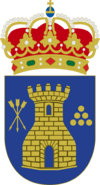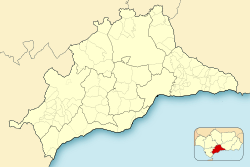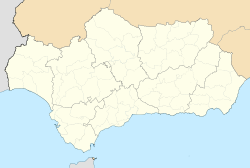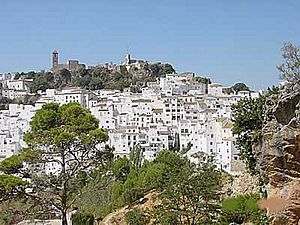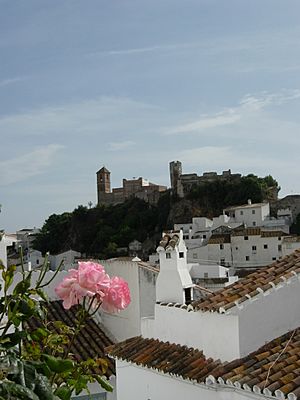Casares, Málaga facts for kids
Quick facts for kids
Casares
|
||
|---|---|---|
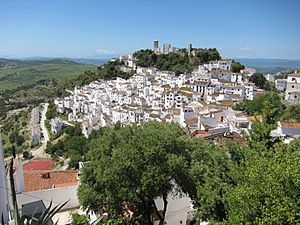 |
||
|
||
| Sovereign state | ||
| Autonomous community | ||
| Province | ||
| Comarca | Costa del Sol Occidental | |
| Area | ||
| • Total | 160 km2 (60 sq mi) | |
| • Land | 160 km2 (60 sq mi) | |
| • Water | 0.00 km2 (0 sq mi) | |
| Population
(2018)
|
||
| • Total | 6,121 | |
| • Density | 38.3/km2 (99.1/sq mi) | |
| Time zone | UTC+1 (CET) | |
| • Summer (DST) | UTC+2 (CEST) | |
Casares is a charming town and municipality in Spain. It is found in the Málaga province, which is part of the autonomous community of Andalusia.
Contents
Discover Casares: Location and People
Casares is home to about 6,121 people. The municipality covers an area of 160 square kilometers. This means it has a population density of about 25 people per square kilometer.
The town shares its borders with other municipalities like Estepona, Manilva, and Gaucín. Casares is famous for its unique Moorish buildings. These buildings cling to the cliffs, making the town look very special.
Casares Through Time: A Rich History
Casares has a long and interesting history. It dates back to Roman times.
Roman Times and Healing Waters
Long ago, the spa of La Hedionda was well-known. It is located on the road to Manilva. Legend says that Julius Caesar, a famous Roman leader, was cured of a liver problem here. This happened thanks to the special sulfuric waters from the local spring. Because of this, Roman emperors allowed Casares to make its own coins.
Moorish Influence and Medieval Pacts
The town's current center grew around a 12th-century castle. This castle was built by the Moors, who ruled Spain for many centuries. In 1361, an important agreement was signed here. It was called the Pact of Casares. Peter I of Castile and the Moorish King Muhammed V signed it. This pact helped Muhammed V get his throne back. Casares then became part of the Nasrid dynasty.
Catholic Rule and Rebellions
In 1485, Casares surrendered to the Catholic forces. This happened after the fall of Ronda. The town was then given to Rodrigo Ponce de León, who was the Duke of Cádiz. Later, there was a big event called the Rebellion of the Moriscos. The Moriscos were Moors who had "converted" to Christianity. Casares played a big part in this rebellion. The Duke of Arcos, a descendant of Rodrigo, accepted the surrender of these rebels. Don John of Austria helped put down the rebellion.
Becoming a Villa and Resisting Napoleon
In 1795, Casares became separate from Manilva. It was given the special title of "Villa." Later, during the time of Napoleon, Casares was one of the only towns in Spain that Napoleon's troops could not capture. The only other town was Cádiz.
Birthplace of a Hero: Blas Infante
More recently, Casares is known as the birthplace of Blas Infante Pérez de Vargas. He is considered a very important historical figure in Andalusia. He was a lawyer, politician, and writer. He is often called the "father of Andalusian nationalism." He was born in 1885 and passed away in 1936 during a civil conflict.
Protecting History
Since 1978, the historical and artistic heritage of Casares has been officially protected. This means the town's special buildings and history are kept safe for future generations.
Fun Times: Celebrations in Casares
Casares has many lively celebrations throughout the year.
Summer Fair (Feria)
The main fair, called the Feria, happens during the first weekend of August. It's a time for fun, music, and community gatherings.
Patron Saint Day
The day of the town's patron saint, the Virgen del Rosario, is celebrated in the first week of September. This is a special religious and cultural event.
Feria del Cristo
In the middle of September, another fair takes place. It is called the Feria del Cristo.
Romero Pilgrimage
The most important Romero, a type of pilgrimage or procession, happens on the last Saturday in May. People gather to celebrate and take part in this traditional event.
How Casares is Governed: Local Administration
The town of Casares has its own local government.
The Mayor and Council
The current mayor of Casares is José Carrasco Martínez. He belongs to a political group called Izquierda Unida–Los Verdes–Convocatoria por Andalucía. This group has seven councillors in the town's ayuntamiento (town hall). The Spanish Socialist Workers' Party has two councillors, and the People's Party also has two. These councillors help make decisions for the town.
Voting in Casares: Elections
People in Casares vote in elections to choose their leaders. In the 2016 Spanish General Election, different political parties received votes in Casares. The Spanish Socialist Workers' Party got 31% of the votes. A group made up of Podemos, Izquierda Unida, and Equo got 27.43%. The Partido Popular received 24.65% of the votes.
Famous People from Casares
- Blas Infante - A very important figure in Andalusian history.
See also
 In Spanish: Casares (Málaga) para niños
In Spanish: Casares (Málaga) para niños
 | George Robert Carruthers |
 | Patricia Bath |
 | Jan Ernst Matzeliger |
 | Alexander Miles |


